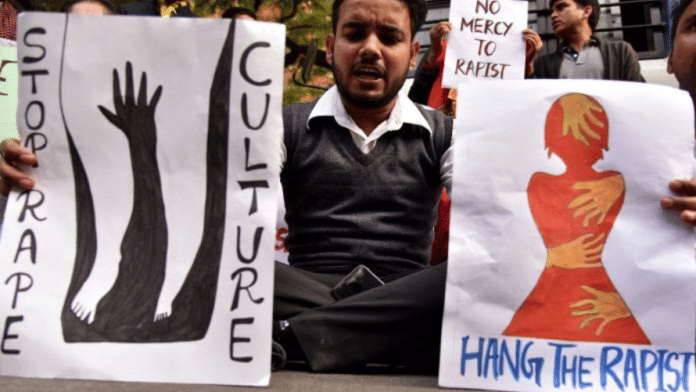New Delhi: A sessions court in Jammu and Kashmir’s Anantnag has sentenced a man convicted of raping and impregnating his minor daughter to life imprisonment, calling it a “symbol of extreme depravity, mental sickness and the complete collapse of ethical values”.
The judgment, delivered by the judge Tahir Khurshid Raina, casts a spotlight on what it called the collapse of “familial trust” and “ethical values” within the society while posing several “questions to the society for introspection as to where it has gone astray, that even a protector of his daughter has turned into her tormentor”.
The court, while handing the sentence on 26 October, said the conviction casts a “death shadow on the pious and beautiful relation between a father and a daughter” and stressed that the sentence must send a deterrent message to shape and strengthen the moral fabric of the society.
The victim—who was a little over 15 years when she was sexual assaulted in January 2022—tearfully asked while deposing against the convict, “whether any father does such an act with his daughter?”
This question, the court observed, was “not only directed at the convict but to the society as a whole”.
Moving beyond the penal aspect, it questioned the state of societal safety, especially concerning young girls. The judgment also questioned the foundational security of families, asking, if daughters are “truly safe and secure in their homes and hearths?”
Calling the victim’s question “an eye opener”, the court said it “felt shell-shocked while convicting the father for committing such a heinous crime”.
It further questioned the efficacy of punishment as a social remedy, asking society to introspect “whether merely awarding a sentence by the court to the convict-father will help in rejuvenating the withering probity level of the society?”
It also asked “whether sentencing will ensure that daughters feel safe and secure even within their own homes, hearths and the community?”
Also Read: The DNA dilemma: How Indian courts differ on ordering paternity tests in rape cases
Precedents & maximum sentence
The court rejected the convicted father’s plea for leniency, which cited his good conduct in jail and status as a first-time offender.
It relied on a recent Supreme Court judgment in the 2025 Bhanei Prasad Raju vs State of Himachal Pradesh case, emphasising the irreparable nature of the breach of trust in “incestuous cases”.
The judge quoted the SC’s finding that “when a father who is expected to be a shield, a guardian, a moral compass, becomes the source of the most severe violation of a child’s bodily integrity and dignity, the betrayal is not only personal but institutional”.
The conviction serves as an “eye opener” to the terrifying reality that the home, which should be a “sanctuary”, has been permitted to become a site of “unspeakable trauma”, the apex court had said in August.
in the present case, the judge noted the irony that it is currently trying another case involving a grandfather accused of raping his granddaughter continuously for two years.
Adopting a resolute and uncompromising stance, judge Raina sentenced the convict to life imprisonment for the remainder of hislife along with a fine of Rs 1 lakh under the Protection of Children from Sexual Offences (POCSO) Act. Under Section 506 of the erstwhile Indian Penal Code (IPC), he was sentenced to seven years of rigorous imprisonment with all sentences set to run concurrently.
Victim rehabilitation
Recognising the “traumatic nature of the offence and the permanent psychological, emotional and social impact upon the minor victim”, the court ordered compensation under the Victim Compensation Scheme of the Code of Criminal Procedure.
It reiterated that the state’s responsibility “in grave sexual offenses, especially incestuous violence”, does not end with the conviction and sentencing of the offender by the court.
“The State is constitutionally and statutorily obligated to provide for rehabilitation, restoration and support to the victim, particularly when the child has been subjected to abuse within the supposed safety of the home by her own father.”
The judge directed the District Legal Services Authority (DLSA), Anantnag, to ensure at least Rs 10 lakh to the victim for her welfare, rehabilitation and educational pursuits. The court specified that this compensation should be deposited into a fixed deposit account managed under the supervision of the Child Welfare Committee (CWC).
(Edited by Sugita Katyal)
Also Read: From child protection to ‘moral policing’ tool: How POCSO Act is leaving courts conflicted






